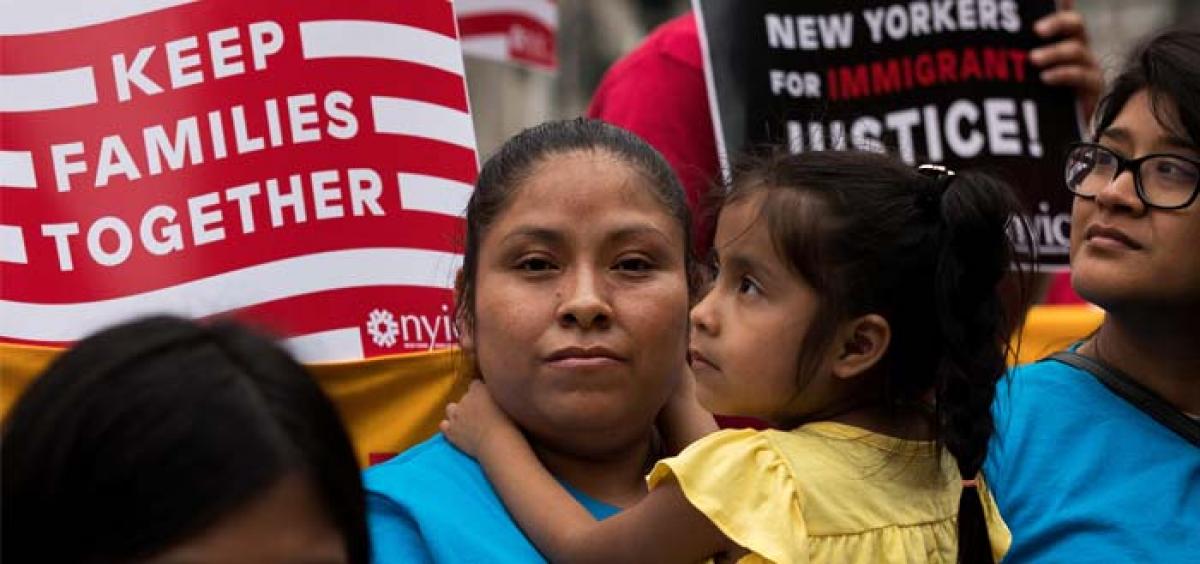Live
- Honda Motorcycle and Scooter India conducts Road Safety Awareness Campaign in Siddipet, Telangana
- Natural Moisturisers You Can Find in Your Kitchen for Dry Skin in Winters
- National Energy Conservation Day 2024: Importance, Date, and Ways to Save Energy
- In 2024, 353 girls enrolled in 33 erstwhile pattern Sainik Schools
- Venkatesh looks as stylish cop in ‘Sankranthiki Vasthunnam’ new song promo
- ‘Drinker Sai’ comes with a catchy song ‘Drinksu Drinksu Drinksu’
- SDT unleashes intensity in ‘Sambarala Yetigattu’ teaser
- Court Adjourns Quash Petition Hearing for Allu Arjun to 21st of December
- Youthful love story ‘Varadhi’ clears censor; set to release soon
- ‘Mardaani 3’ announced with Rani Mukerji’s return as Shivani Shivaji Roy
Just In

Donald Trump declared Monday that the US will not become a \"migrant camp\" as his administration faced a backlash for its practice of separating the children of illegal immigrants from their parents.
President Donald Trump declared Monday that the US will not become a "migrant camp" as his administration faced a backlash for its practice of separating the children of illegal immigrants from their parents.
While the Department of Homeland Security says it has no policy to separate families, such cases have skyrocketed since the administration began systematically arresting migrants for illegally crossing the border -- and separating children from their incarcerated parents.
Here is a look at the key facts and figures behind the crisis:
Despite efforts to stifle it, illegal immigration into the United States remains at high levels.
From March to May this year, more than 50,000 people a month were apprehended for illegally crossing the border from Mexico. About 15 percent of those are arriving as families, and eight percent as unaccompanied children.
Mexican nationals can be pushed back into their country, but an increasing number are from violence-plagued countries of Central America -- Guatemala, Honduras and El Salvador. They are harder to send back.
Many, including almost all of the families and unaccompanied children arriving, request asylum, claiming a "credible fear" of persecution or torture if they return to their country.
Previously, asylum seekers registered their cases and then were released into the United States while the cases were reviewed.
Now, there is a backlog of some 600,000 cases, and many never show up for their hearings, instead disappearing into US society.
The Trump administration says that approach has become a magnet for anyone wanting to enter the United States.
An increasing number of migrants arrive with the help of human smugglers, well-coached to request "credible fear" asylum, and can't be turned back, according to administration officials.
Between October 2017 and April this year, about 700 children were taken from their parents, and held for weeks or sent on to other caretakers before they could be reunited again. But that failed to impact arrivals.
After Trump ordered tougher action, Attorney General Jeff Sessions announced a "zero tolerance" policy on May 7.
Under the measure, anyone who illegally crosses the border will be arrested on criminal charges. For those who come with families, their children are removed from them. Sessions said this policy aimed to deter others from arriving.
In the five weeks from the announcement, more than 2,300 children were taken from their parents and adult relatives.
It can take days or weeks for the adults to be tried on the charges.
Most are encouraged to plead guilty, at which point they are given a sentence of "time served." They are then released while their asylum claim is reviewed, but they have a criminal record -- a permanent strike against them.
Trump says that a law he inherited from the previous Democratic administration forces him to separate immigrant families. But Sessions and others have referred to a policy of prosecuting adults for illegal border crossings.
In fact, no one is forcing the government to prosecute immigrants who are apprehended.
But that forces the separation. When the parents are arrested on criminal charges, they must be separated from their children, as is the case with domestic criminal cases. They cannot take their children to court.
"If you cross this border unlawfully, then we will prosecute you," Sessions said. "If you are smuggling a child, we will prosecute you and that child will be separated from you as required by law."
Once taken from their parents, the children are handed over to the Office of Refugee Resettlement of the Department of Health and Human Services.
The children, who range in age from one to 18 years old, are placed in holding centers, some of which are tent-covered operations where they sleep on mats on concrete floors in units delineated by chain-link fences resembling cages.
ORR now has 12,000 illegal immigrant children in their care, 10,000 of whom crossed the border without their family.
ORR seeks to resettle the children with relatives already inside the United States, a process that can take many months.
For those separated from their parents, ORR has also sought to resettle some with relatives inside the United States.
The government says they can be reunited with their parents, though how fast and easily that can happen remains unclear.

© 2024 Hyderabad Media House Limited/The Hans India. All rights reserved. Powered by hocalwire.com







